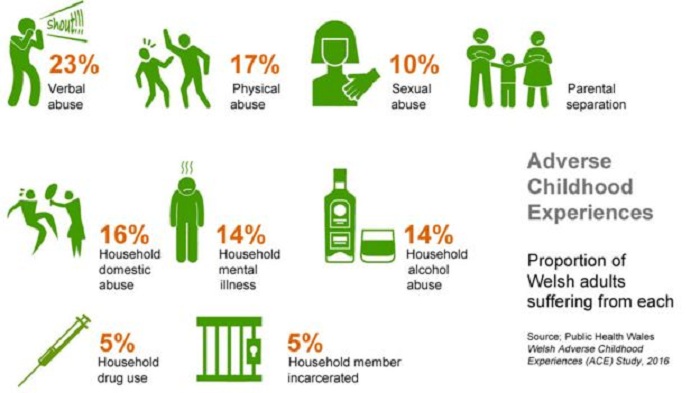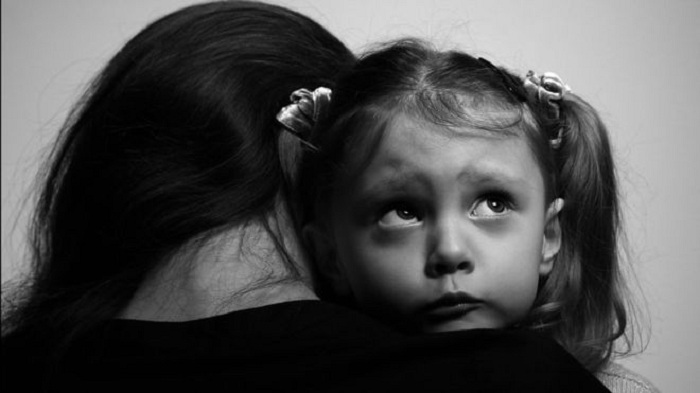Children with four or more ACEs, around 14%, are three times more likely to get lung or heart disease later in life.
One senior health figure said instead of "mending broken adults" a focus was needed on "building stronger children".

The findings are being published to coincide with a major international public health conference, hosted by PHW in Cardiff.
It is the last of three PHW studies looking at the first 1,000 days of life. More than 2,000 adults in Wales were interviewed.
The importance of giving children the best start in life has long been appreciated.
But this research looks at the long term impact of bad experiences in those crucial early years and how it could mean more chronic illness and more pressure on frontline services further down the line.
Those having had four or more ACEs are also:
- Twice as likely to be frequent visitors to the GP over a yearly period
- Three times as likely to have gone to A&E or to have spent a night in hospital.
- Four times more likely to develop type 2 diabetes than a child with no experiences.
- A quarter by the age of 49 were diagnosed with one or more chronic disease. This compares with only 6.9% in those with no ACEs.
Prof Mark Bellis, director of policy and research at Public Health Wales said: "Most of us have the odd shock in childhood and after that we relax and we`re comforted by parents and our bodies develop at that lower, more relaxed level.
"But if you get constant exposure to adverse childhood experiences, your body develops at a higher state of tension, it`s always looking out for more threats.
"That means as your body develops, it`s used to being ready to be injured or hurt in some way and it wears out quicker.
`Symphony of genes`
"You`re also more ill at ease, you may develop poorer metal health, you`re more likely to use alcohol and drugs - and they increase your risks of ill health later on in life. All that adds up to you developing poor health, earlier."
But a child can experience adverse incidents even from within the womb.
NSPCC midwife Nikki Rhys-Jones said: "In the second trimester [the period from 13 to 27 weeks] of a woman`s pregnancy, the baby can hear - so the baby will be aware of the sounds around her.
"So the baby can start relating and connecting to parents, however things like domestic abuse, violence in the household, shouting - a baby will experience that and those things will cause stress to a baby and impact on its development."
Emerging research suggests the effects could also be passed on from one generation to the next.
Genomic expert Dr Tom Connor, consultant for Public Health Wales and senior lecturer at Cardiff University, said: "As individuals, we`re almost a symphony of genes, firing off at different times.
"Epigenetics [which looks at changes in genes] actually controls expression of genes - and so things like smoking and drinking can actually affect the expression of genes, which can be passed on to our children.
"There`s growing evidence that the lifestyle choices we make ourselves have an effect on our children. That`s an immediate effect when they`re born and potentially if we do things, for example smoking which can do damage to our children`s DNA, that can be a long term effect for their entire lifetime."
Children who have had four or more adverse incidents are also 15 times more likely to be a perpetrator of violence, and 14 times more likely to be a victim.
Alun Michael, South Wales Police and Crime Commissioner said the force was being made more aware of the impact of domestic incidents on children in the background - and it can only improve with all agencies working better together.
"There`s tended to be an attempt to deal with those things by making referrals - pieces of paper passing from one organisation to another. You`re never quite sure where they go," he said.
But a coordinated approach is not always easy to achieve, he argues, at a time when public spending is being squeezed.
"If everyone shrinks into their core responsibilities, the cracks get bigger and more and more people fall down the cracks and the consequences are more complex and dangerous further down the line," said Mr Michael.
"There`s been a general feeling within Wales we must shrink together and not shrink apart. It`s more important that we don`t allow those gaps, that we don`t let people fall down the cracks; we work together for a joined up approach."
For Prof Bellis it is crucial for the future to get it right.
"The long term costs of leaving these things untreated are enormous," he said. "What we`ve got to focus on is instead of mending broken adults we must build stronger children."
















































